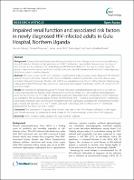Impaired renal function and associated risk factors in newly diagnosed HIV-infected adults in Gulu Hospital, Northern Uganda

View/
Date
2015Author
Odongo, Pancras
Wanyama, Ronald
Obol, James Henry
Apiyo, Paska
Byakika-Kibwika, Pauline
Metadata
Show full item recordAbstract
Background: Screening for renal diseases should be performed at the time of diagnosis of human immunodeficiency
virus (HIV) infection. Despite the high prevalence of HIV/AIDS in Northern Uganda, little is known about the status of
renal function and its correlates in the newly diagnosed HIV-infected individuals in this resource limited region. We
aimed to determine the status of renal function and factors associated with impaired renal function in newly diagnosed
HIV-infected adults in Northern Uganda.
Methods: This was a seven month cross-sectional hospital-based study, involving newly diagnosed HIV-infected
patients, 18 years and older. Patients with history of diabetes mellitus, hypertension and renal disease were
excluded. Estimated glomerular filtration rate (eGFR) was calculated using Chronic Kidney Disease Epidemiology
Collaboration (CKD-EPI) formula (Table one). Factors associated with impaired renal function (eGFR < 60 ml/min/1.73 m2)
were thus sought.
Results: We enrolled 361 participants (230, 63.7% female) with Mean ± standard deviation age of 31.4 ± 9.5 years. 52,
(14.4%) had impaired renal function (eGFR <60 mL/min/1.73 m2) and of this 37 (71.2%) moderate renal impairment
(eGFR 30–59.9 mL/min/1.73 m2) while 15 (28.8%) had severe renal impairment (eGFR <30 mL/min/1.73 m2). Proteinuria
was recorded in 189 (52.4%) participants. Of these, 154 (81.5%) had mild (1+) while 8 (4.2%) had severe (3+) proteinuria.
Using logistic regression, age, CD4 cell count, and proteinuria were significantly associated with impaired renal function;
age >34 years (OR 2.8, 95% CI 1.3 – 5.9; P =0.009), CD4 count <350 cells/μL (OR 2.4, 95% CI 1.0-4.7; P =0.039) and
proteinuria (OR 9.6, 95% CI 5.2–17.9; P < 0.001).
Conclusion: The prevalence of impaired renal function was high in new HIV-infected individuals in this region
with limited resources. So, screening for renal disease in HIV is recommended at the time of HIV diagnosis
Collections
- Research Articles [17]
